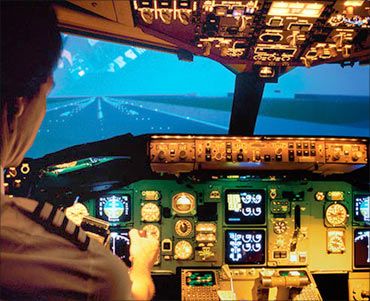
With the airline industry in recession, those training to be pilots may not find a job after spending lakhs on their airborne dreams. Is there any hope?
Chitra Vedak separated from her husband when her son was barely three months old.
A technician nurse at a private hospital in Mumbai, she brought up Pratik single-handedly.
Chitra recalls that as a child, Pratik always gravitated towards toy planes. All he ever wanted was to fly. So, his single mother worked hard to fulfil her son's dream, even mortgaging a house in Mumbai to pay for his pilot training in the US.
Pratik has been sitting it out on the bench for close to two years. He had to take a break as funds were running out.
The salary of a pilot averages a lakh a month. If Pratik was able to complete his course on schedule and if he had landed up a job, it would have taken around four years to pay back the 16 lakh loan.
Chitra's voice trails off when she says that she has to pay loan instalments of Rs 35,000, month after month. But that's not the half of it.
Please click NEXT to continue reading

An office in the skies
Chitra had been told that they would have to shell out only 16 lakhs for the entire training and accomodation. Once the course started, they found that they would have to pay an additional 12 lakhs for the Commercial Pilot License (CPL).
The earlier amount only sufficed for a PPL (Private Pilots License). She has had to sell off jewellery and dip into their savings, just so he could continue. At this stage, dropping out midway would mean 16 lakhs gone in vain.
But spending a further 12 lakhs means selling the house and that still doesn't guarantee a job. It's a tough call. Pratik, 22, is one of thousands who bought into the dream of a career in the skies.
Airline boom effect
In India, being a pilot used to be a rich kid's dream. Popular middle class aspirations for wealth usually had something to do with higher education and not a life of adventure, especially in a place as high as the sky.
But somewhere in the last 10 years that has changed. The mid nineties saw private sector investment in aviation.
India saw unprecedented growth and riding the boom, were the airlines. This is also one of the only high paying sectors with low qualification barriers.
Unlike certificate-heavy options like engineering, software, or management, to be a pilot all one needed was Class 12 science. It was a profession defined not by qualification, but by skill.
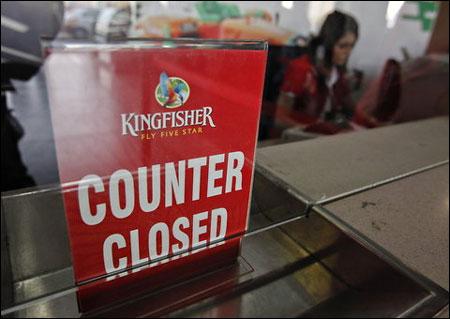
An attractive proposition
Add to this, starched uniforms, beautiful people, soaring salaries, travel and the sheer appeal of a plane.
The plot is bought, hook, line and sinker. But unlike engineering or medicine where parents convinced their children, aviation saw children convincing their parents.
With the easy availability of loans, many families mortgaged or sold property to pay for the training. It was a way of breaking out and entering the next salary strata. When times were good many did so. But now the ground view is starkly different.
Effects of recession
The airline industry is in the grip of a recession. Most airlines are in the red. None of them are hiring. At present, there are close to 6,000 unemployed pilots in India. About 600 to 800 fresh pass-outs come in every six months. Very few of them will get jobs.
If you do a Google search and type in "unemployed pilots", you'll get close to two million hits. Chances are you'll also stumble onto a couple of Facebook communities and online forums.
Each day sees hundreds of posts on the problems faced by them. Though their stories are often sad, they put up a brave front. Humour helps.
One of the posts read: "We pilots are like Parle G biscuits, found even in a local paan shop, but no one cares to buy."
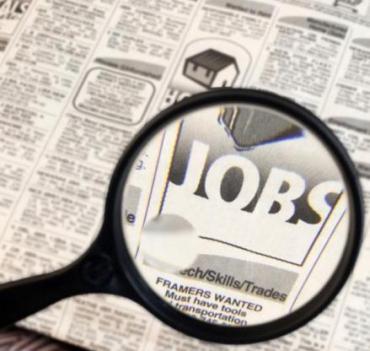
No backup plan
Most did not continue with their education beyond Class 12, the mandatory minimum to be a pilot. Not being a graduate, alternate career options are limited.
Many of them are biding time in call centres or working in malls. Each of them has spent upwards of 25 lakhs on training to be a pilot. It is a depressing scenario. Certainly not the life in the skies, they envisaged for themselves.
The rosy picture painted during boom times convinced families to part with their lifetime savings. The culprit, besides the times we live in is in the lack of information about ground reality.
A number of students blame a hyper reactive media that peddles success stories that made it seem like jobs were pouring from the skies.
Desperate measures
For every job that is advertised, there are 150 to 200 applicants. That's a very tough ratio to crack even for the best among them.
Like in any other industry, a small but significant percentage of those jobs go to the ones with some influence on the inside.
When the situation gets desperate, some are okay with paying a bribe. It is reasoned out as an extra cost to recoup the earlier investment. If this is what these times demand, so be it -- this seems to be the rationale.
According to sources that want to remain anonymous for obvious reasons, the going rate is 25 lakhs. However that is no guarantee for getting the job, as was the case with a Gurgaon-based pilot.
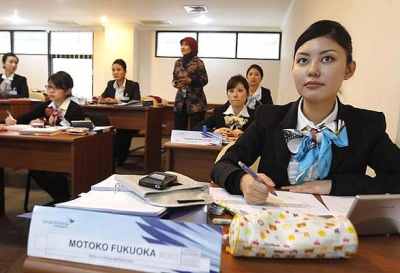
Beware of touts and agents
After spending close to 30 lakhs on a CPL and then not getting a job, his family gave an additional 20 lakhs to a tout who promised a job, which did not materialise.
While there is very little sympathy for such cases, a lot of families are pushed to a corner. If after spending 30 lakhs, you still do not get a job, families get desperate and go into the deep end.
With so many institutes abroad wooing students here, there was a rise in the number of agents setting up shop. Many of them are just unscrupulous commission shops in the guise of a consultancy.
They often understate the costs involved to get families to part with an initial sum.
When Pratik landed in Texas, he had to sit it out on the bench for a month because his agent did not deposit his fees to the flying school. This isn't a stray incident. Pratik says the agent is currently wanted in the US for fraud.
Lack of awareness
Many applicants are in their late teens, and not really in a position to access the situation in the industry. Their families are equally in the blind. Parents, out of love for their children give in and let them chase these dreams.
"But it's a dream with no guarantees," says Captain Harish Shreyan, Vice President of the Indian Commercial Pilots Association.
"Being a pilot is the only profession in the world where one has to study throughout one's life. It costs 25 lakhs to get a basic CPL. Every time a pilot upgrades to train for a bigger aircraft, he has to spend an additional 25 to 30 lakhs. These investments have to be recovered," he adds.
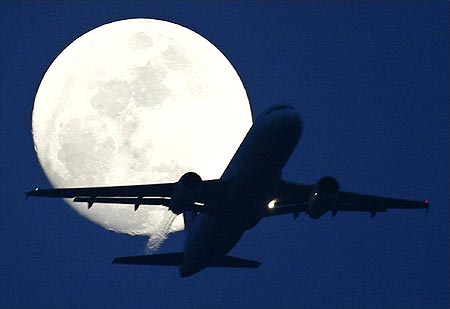
Regulations missing
It doesn't help that the Directorate General of Civil Aviation (DGCA), the main body in the aviation sector is not very student-friendly.
With no accreditation system in place, there is much room for touts and cheats.
For overseas education, the US and Canada have emerged as preferred destinations to train. However, being a highly machine-dependent technical course, students going abroad are in no position to assess the quality of their education.
This is where DGCA could step in by rating courses to weed out the dummy ones.
A costly but priceless pursuit
Ironically, it costs more to study in India than abroad. The high cost of fuel and import duties on aeroplanes are cited as reasons.
At present, none of the airline companies are recruiting. Internationally too, the prospects don't look much better, hence, this is probably one of the worst times to enter this business.
Students and families are advised to defer plans.
Despite all these negatives Pratik says as he gets up to leave, "Do you know the really great thing about flying? It's the view from the office".
He smiles and walks on. Nothing can beat his passion.